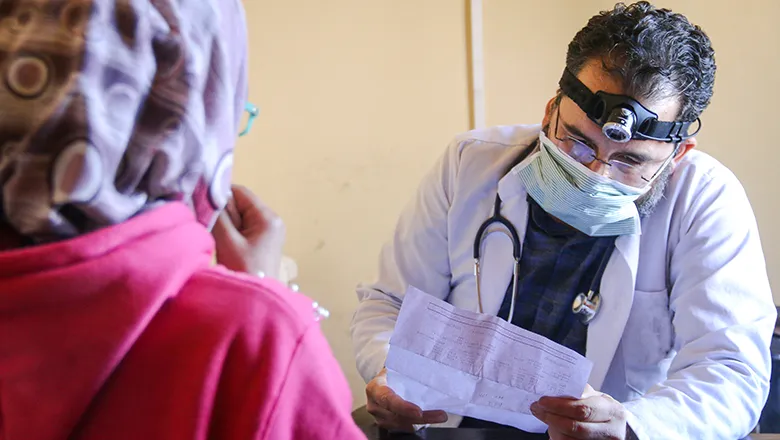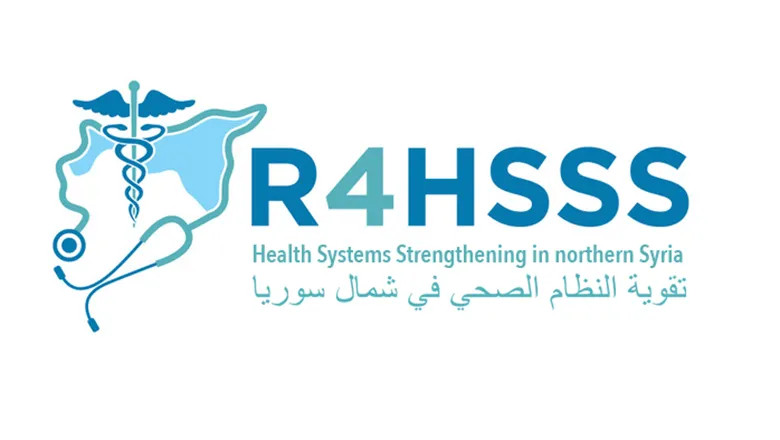17 November 2020
£4 million granted to improve health systems in northern Syria
The project will offer recommendations for re-building health systems in one of the worst hit regions of Syria.

A £4 million grant has been awarded to the Conflict and Health Research Group (CHRG),
in the Department of War Studies, King’s College London, for a project aimed at supporting health systems in northern Syria.
The grant, awarded by the National Institute for Health Research (NIHR), will support the work of a research consortium of partners, which has already developed extensive knowledge of health systems on the ground in Syria. Alongside the CHRG at King’s, it includes the Union of Medical Care and Relief Organisations.
The project, Research for Health Systems Strengthening in northern Syria (R4HSSS), will focus on conducting research on the state of health systems in north-west and north-east Syria, a region held by opposition forces, which has been one of the hardest hit areas by the conflict.
To date, the majority of health research concerning the war in Syria has focused on healthcare provision for Syrian refugees in neighbouring countries and in Europe. There is a stark gap in knowledge and understanding of what is happening in the country itself, and with approximately 13.2 million Syrians needing health assistance, there is a vital need for more robust systems of evidence-led healthcare practice.
The conflict of now almost 10 years, has caused a severe disruption in health services leading to a collapse of the health system in the most conflict-affected areas. Healthcare facilities and workers have also been the target of attacks and bombing, in what some have described as a ‘weaponisation’ of healthcare, with the UN estimating half of the health facilities only partially functional or destroyed. Essential services have been further disrupted by the increasing number of health professionals fleeing the country. This has left populations with limited access to services, leading to increased vulnerability to communicable diseases such as TB and polio and non-communicable diseases such as cancer.
The picture has been further complicated by the emergence of three distinctive territories in Syria now controlled by various political factions, each with their own healthcare systems, structures and mechanisms. Through on the ground research and visits to the region, researchers will explore various strategies to strengthen these emergent health systems, the way they’re impacted by ongoing conflict, and how ultimately they can be integrated into a national health system in a future post-conflict scenario.
As part of the work, researchers will analyse four key areas, including the provision of health services, health education of medical practitioners and local populations, as well as medical training, how services are financed, and how digital solutions can be used to support health information systems.
The research findings will not only support and strengthen healthcare provision on the ground in Syria, they will also be used to produce a model of health system strengthening in conflict settings, which can be applied in other countries and regions affected by protracted and complex conflicts and support wider peace building initiatives. Researchers hope the recommendations they provide will also support health governance and more effective resource allocation to improve health system performance and sustainability in countries like Syria.
Dr. Abdulkarim Ekzayez, one of the co-investigators said:
“We welcome this funding from the NIHR that will help us work with partners on the ground in Syria to find solutions to the most vital humanitarian and healthcare needs in the region.
"Our programme highlights the increasing importance of valuable multidisciplinary partnerships between research institutes and humanitarian organisations in conducting health research on the ground. By working in collaboration, we hope to explore approaches that will make a difference to healthcare systems in Northern Syria, and in turn lead to improved research practices in conflict settings."
The National Institute for Health Research (NIHR) is the nation's largest funder of health and care research. The NIHR was established in 2006 to improve the health and wealth of the nation through research, and is funded by the Department of Health and Social Care. In addition to its national role, the NIHR supports applied health research for the direct and primary benefit of people in low- and middle-income countries, using UK aid from the UK government.

R4HSSS project
To learn more about the Research for Health Systems Strengthening in northern Syria (R4HSSS), visit the website, follow the project on Twitter or email hsss@kcl.ac.uk.
Researchers share expertise on Syrian healthcare at a conference
At the end of October, the research consortium including partners from the Syrian Research Group at the London School of Hygiene and Tropical Medicine, and the Syria Public Health Network, held a one-day conference Research for Health in the Syrian Conflict.
Building on the success of the previous conference in 2019, this year’s event provided a rich platform for Syrian and UK academic experts and health practitioners, Syrians working in NGOs on the ground, as well as the diaspora, to share new insight on strengthening Syrian health systems. It also enhanced existing and created potential partnerships and collaborations between academics and practitioners.
14 research papers were presented, the vast majority from Syrian diaspora and Syrians based in Syria, focusing on topics including health system governance, the impact of the COVID-19 pandemic, medical education and training, non-communicable diseases, maternal health and clinical practice.
